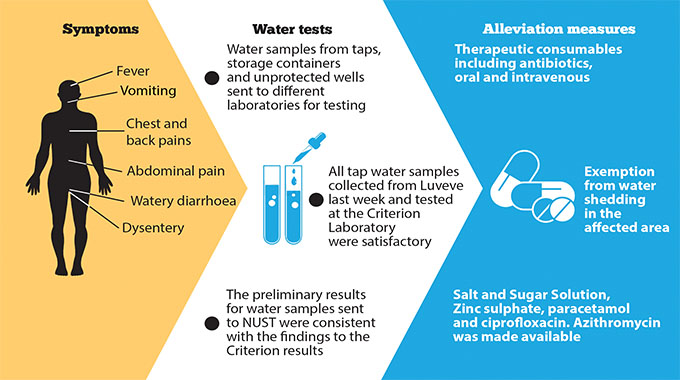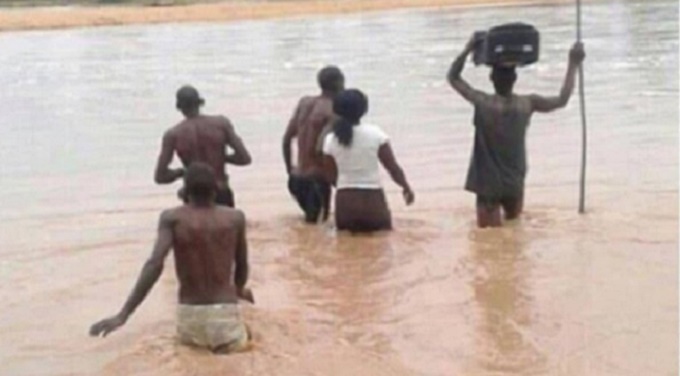Luveve deaths: Water quality tests inconclusive

Nqobile Tshili, Chronicle Reporter
TWELVE people including two senior citizens from Entembeni Old People’s home have died since diarrhoea broke out in Bulawayo’s Luveve suburb last month.
Last week on Friday, the death toll was pegged at nine after three people died at home without seeking medical attention.
Gastrointestinal disease has been identified as the cause for the diarrhoea outbreak, although its source is yet to be established.
The first person to die of gastrointestinal disease was a 55-year-old man from Gwabalanda suburb who died on May 23 while the last death was recorded on Friday involving a 22-year-old man from Mpopoma suburb.
The oldest to succumb to the disease are two men housed at Entembeni Old People’s Home aged 87 and 96 years.
An eight-year-old from Montrose suburb was the youngest victim.
As of Monday, a total of 1 529 people had been treated; 1 356 at council clinics and Mpilo Central Hospital, and 173 attended to from home.
Authorities say 132 patients have since recovered.
The city’s health department visited 279 homes mostly in Luveve suburb in a door-to-door campaign to identify patients.
Government attributed the disease outbreak to Bulawayo’s 144-hour water shedding exercise and vandalism of sewerage pipes.
Residents have blamed the city’s water for the diarrhoea outbreak but tests are yet to validate the claims.
Water quality tests done by the Bulawayo City Council, National University of Science and Technology (Nust) and Cimas laboratories have been inconclusive on what caused the outbreak.
Further tests need to be done at Lancet laboratories, however, this has been derailed by lack of funds, a council report has stated.
The report was tabled before a Government technical committee looking into the issue of diarrhoea outbreak in the city yesterday.
The report states that council had to validate death toll figures after official numbers differed from those given by the community members.
“The initial discrepancy between official death statistics obtained from health institutions and those obtained from the community prompted investigations on the source of the additional figures.
“Consultations conducted at Luveve Police Station revealed that there were three community deaths which were attended by the police in the suburb,” reads the report.
It is reported that some people did not seek medical treatment fearing that they would be diagnosed of Covid-19 and isolated.
“Some said frequency of stools was too high to move to the clinics or they did not have money to pay for service fees at the clinic,” reads the report.
BCC reported that the number of patients seeking treatment increased after council started offering free treatment.
“It was also observed that the affected cases were not administering the homemade sugar and salt solution as they did not have sugar or salt at times. ORS at clinics was distributed to those affected.
“There was a report of a family that mistakenly consumed rat poison that looked like sugar. Further to that there were ad-hoc reports of consumption of sugar cane which had been irrigated with water from undesignated sources,” read the report.
The report shows that collaborative laboratory tests have proved that the city’s water is clean.
“At least 20 water samples were sent to Nust for bacteriological and chemical analysis on the 18th of June 2020.
“The laboratory is able to identify presence of coliforms both faecal and non-faecal. It however cannot test for presence of Salmonella (caused by contaminated water or food). The preliminary results for water samples sent to Nust were consistent with the findings to the Criterion results,” the report states.
“In a meeting held with Nust laboratory staff there was a suggestion that search for the causative agent in the diarrhoea should be expanded to include Ecoli and other bacteria as analysis has failed to pick up Shigella and Salmonella in most of the samples analysed. The analysis of the other microorganisms will require resources. There was a suggestion that medium of transmission should be expanded beyond water and also include foodstuffs.”
The local authority stated that in Old Luveve and Mpopoma patients did not come from areas that were affected by sewer pipe bursts. — @nqotshili.











Comments